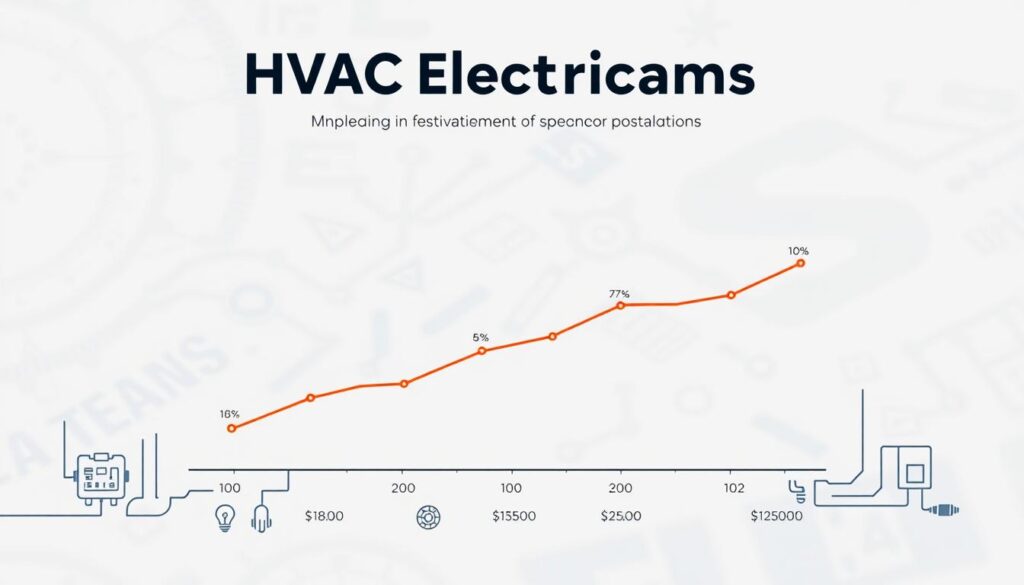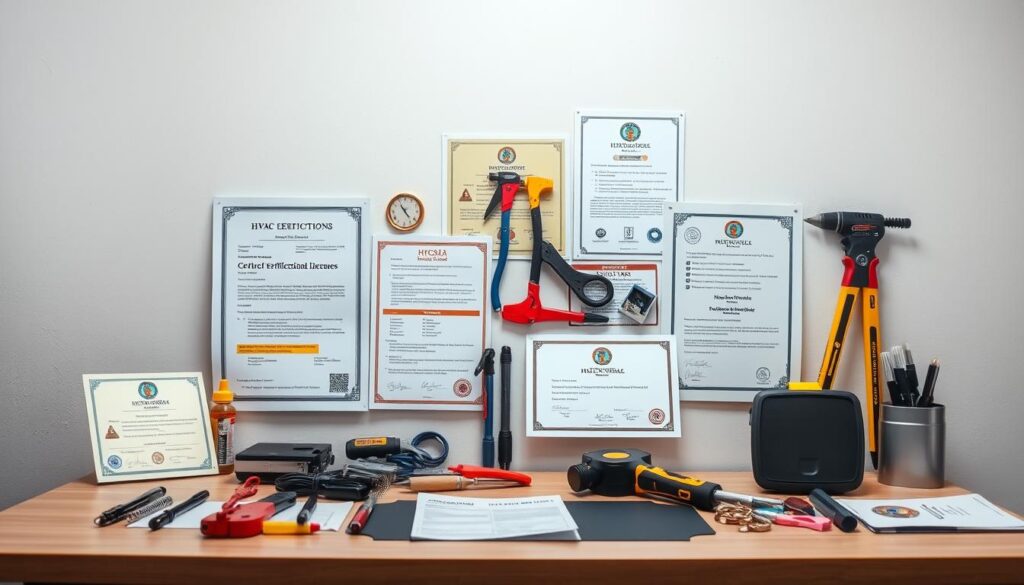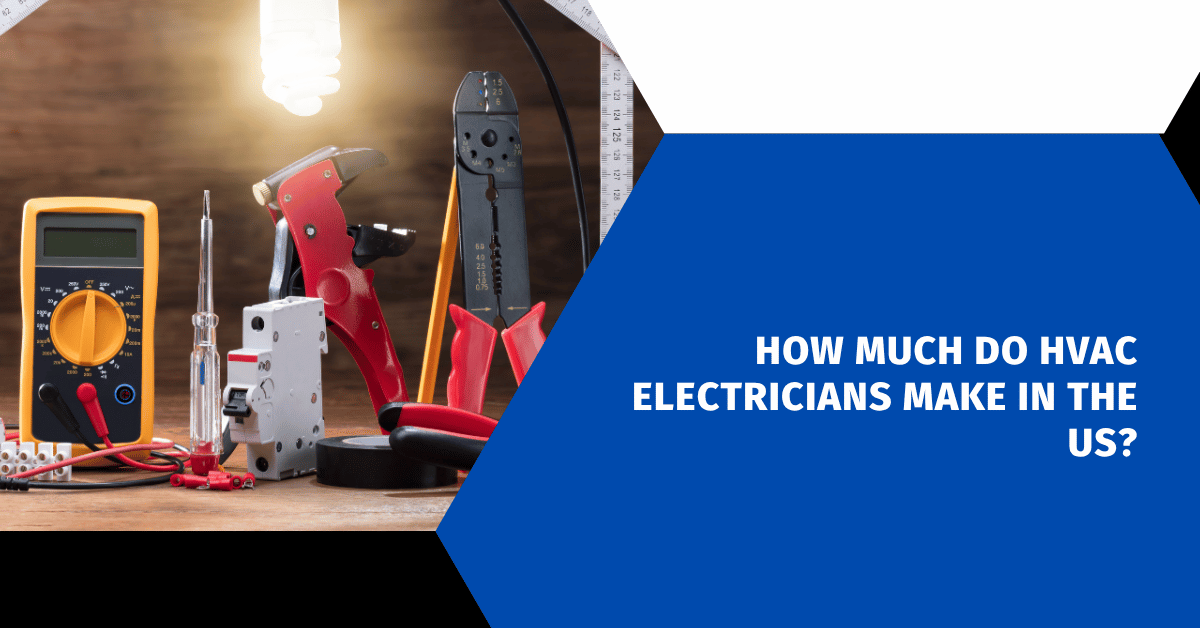
How Much Do HVAC Electricians Make in the US? Are you curious about the financial side of HVAC electrical work? With more demand for skilled technicians, knowing how much HVAC electricians make is a good starting point. It could lead you to a rewarding career.
The salary for HVAC electricians is quite promising. The Bureau of Labor Statistics says they make a median of $50,590 a year. That’s about $24.32 an hour.
How much you can earn depends on several things. These include where you live, how long you’ve been working, and what industry you’re in. If you’re thinking about starting or growing your HVAC career, it’s important to understand how salaries work.
Key Takeaways
- Median annual HVAC electrician salary is $50,590
- Hourly rates average around $24.32
- Earnings vary by state, experience, and industry sector
- Career offers stable income and growth opportunities
- Specialized skills can greatly increase your earnings
Table of Contents
Understanding HVAC Electrician Salary Basics
HVAC electrician wages are key in the trade’s world. Knowing the money side is vital for career choices.
HVAC electricians earn in different ways. It’s not just an hourly rate. There are many parts to their pay that affect how much they take home.
National Average Salary Overview
HVAC electricians make between $46,000 and $68,000 a year. On average, they earn about $29.00 an hour. This is a good income for those skilled in this field.
- Entry-level positions start near $46,000
- Experienced technicians can earn up to $68,000
- Hourly rates average around $29.00
Base Pay vs Total Compensation
Base pay is just part of what HVAC electricians can earn. They also get extra money through:
- Performance bonuses
- Overtime pay
- Healthcare benefits
- Retirement contributions
Salary Components and Structure
Many things affect HVAC electrician wages. Knowing these helps you plan your career better.
| Salary Component | Potential Value |
|---|---|
| Base Hourly Rate | $25 – $35 |
| Overtime Pay | $35 – $50 per hour |
| Annual Performance Bonus | 2% – 10% of base salary |
| Healthcare Benefits | $5,000 – $12,000 annually |
Pro tip: Keep learning and specialize to increase your earnings over time.
How Much Do HVAC Electricians Make: A Complete Salary Breakdown
Knowing how much HVAC electricians make is key for those thinking about this career. The salary varies based on several important factors.
Exploring HVAC electrician salaries shows a range based on experience and specialization. New HVAC electricians start with good pay that increases with experience.
- Entry-level positions: $42,000 – $55,000 annually
- Mid-career professionals: $55,000 – $68,000 annually
- Experienced specialists: $68,000 – $85,000 annually
Your salary depends on a few key things:
- Geographic location
- Specialized skills
- Industry sector
- Professional certifications
Commercial HVAC electricians usually make more than those working in homes. Industrial specialists earn the most due to their complex work and specialized knowledge.
Investing in continuous training and advanced certifications can significantly boost your hvac electrician income over time.
Those with advanced skills and extra qualifications see big salary jumps. Top HVAC electricians in big cities can make up to $90,000 a year. They focus on new technologies and complex installations.
Explore Our HVAC Shop
Looking for top-rated HVAC tools, parts, and accessories? Visit our shop and find the perfect solution for your needs.
Visit the ShopGeographic Salary Variations Across the US
Your pay as an HVAC electrician can change a lot based on where you work in the United States. The location you choose greatly affects how much you earn. Some places pay a lot more than others.
Knowing about these differences can help you plan your career better. It can also help you earn more in the HVAC electrical field.
Highest Paying States for HVAC Electricians
Some states pay HVAC electricians more than others:
- Alaska: Leads with highest average wages due to extreme climate demands
- Massachusetts: Strong industrial infrastructure drives competitive salaries
- New Jersey: High cost of living translates to higher hvac electrician pay
- California: Tech-driven economy supports robust HVAC electrical markets
- District of Columbia: Government and commercial projects boost compensation
Metropolitan Areas with Top Salaries
Big cities often have the best jobs for HVAC electricians. Places like San Francisco, New York, and Boston pay more than rural areas.
Regional Salary Differences
Regional economic factors affect HVAC electrical wages:
- Northeast: Highest average salaries, driven by complex infrastructure
- West Coast: Tech-heavy markets with competitive compensation
- Midwest: Stable but moderate wages, steady industrial demand
- Southern States: Lower wages, but increasing demand in growing markets
Your location can make a big difference in your earnings. It’s important to research the area for the best HVAC electrical career.
Experience Levels and Corresponding Pay Scales
Your HVAC electrician salary increases with experience and skills. Beginners start with good pay, while experts earn much more.
Knowing how salaries rise helps you map your career. HVAC electrician wages grow with experience and certifications.
- Entry-Level (0-2 years): Typically earn $25-$30 per hour
- Mid-Level (3-5 years): Wages increase to $30-$35 per hour
- Experienced (6-10 years): Can reach $35-$40 per hour
- Senior Technicians (10+ years): Earnings of $40-$45 per hour
Your salary as an HVAC electrician depends on several factors:
| Career Stage | Typical Hourly Rate | Annual Salary Range |
|---|---|---|
| Apprentice | $18-$22 | $37,440-$45,760 |
| Journeyman | $25-$35 | $52,000-$72,800 |
| Master Technician | $35-$45 | $72,800-$93,600 |
To boost your salary, get advanced certifications and specialize in complex systems. Keep your skills sharp. Employers reward those who show they’re committed to learning.
Invest in your skills, and your hvac electrician wages will reflect your professional growth.
Industry Sectors and Their Impact on Earnings
The HVAC electrician industry has many sectors, each affecting earnings differently. Knowing these differences helps you plan your career for better pay.
Your earnings as an HVAC electrician change based on the sector you work in. Some sectors pay more than others.
Commercial vs Residential HVAC Work
Commercial HVAC jobs usually pay more than residential ones. This is because commercial projects are bigger and more complex. Key differences include:
- Larger, more complex commercial systems
- Higher technical skill requirements
- Longer project durations
- Increased compensation for specialized knowledge
Industrial HVAC Specialization
Industrial HVAC jobs are a premium segment for skilled electricians. They require advanced skills and often come with good pay. Specialized industrial HVAC electricians can expect:
- Higher base salaries
- More complete benefit packages
- Chances for advanced technical training
- Potential for big overtime pay
Government and Institutional Positions
Government and institutional HVAC electrician jobs offer stable work with good pay. These roles often include:
- Predictable salary schedules
- Comprehensive health benefits
- Retirement planning options
- Job security
Your choice of sector greatly affects your earnings as an HVAC electrician. By understanding each sector’s unique aspects, you can make better career choices.
Explore Our HVAC Shop
Looking for top-rated HVAC tools, parts, and accessories? Visit our shop and find the perfect solution for your needs.
Visit the ShopEducation and Certification Requirements

Getting ahead in the HVAC electrician field means investing in your education and getting certified. The right training and certifications can really up your hvac electrician pay. Knowing the best educational paths can help you earn more in this exciting trade.
Certification is key to your hvac trade electrician pay. It shows you’re skilled and serious about your career. Here are the top certifications to aim for:
- EPA 608 Certification: Needed for working with refrigerants
- NATE (North American Technician Excellence) Certification
- HVAC Excellence Professional Level Certification
- R-410A Refrigerant Handling Certification
What you need to study includes:
- A high school diploma or similar
- Technical school training (1-2 years)
- Apprenticeship program (3-5 years)
- State licensing needs
Investing in your education can really pay off. Getting trained in commercial HVAC or energy-saving tech can make you stand out. Keep learning with workshops and advanced certifications to show you’re serious about growing.
“The more skills you develop, the more valuable you become in the HVAC industry.” – HVAC Industry Expert
Your career path depends on keeping up with education and certifications. By getting advanced training, you can find better-paying jobs and become a leading HVAC electrician.
Career Progression and Salary Growth
Your career as an HVAC electrician is full of opportunities for growth and higher pay. Knowing the different paths you can take helps you plan your career. This way, you can earn more as an HVAC electrician.
Entry-Level to Senior Positions
As a new HVAC electrician, you can earn between $35,000 and $45,000 a year. With more experience and skills, your career can take off.
- First 1-3 years: Basic installation and maintenance tasks
- 3-5 years: Advanced troubleshooting skills
- 5-7 years: Specialized technical knowledge
- 7+ years: Senior technical roles with higher compensation
Management Opportunities
With experience, you can move into management roles. These jobs pay more and require both technical skills and leadership abilities.
| Management Position | Average Annual Salary |
|---|---|
| Service Manager | $65,000 – $85,000 |
| Project Manager | $70,000 – $90,000 |
| Operations Supervisor | $60,000 – $80,000 |
Business Ownership
Starting your own HVAC business is a big step. Successful HVAC business owners can earn between $500,000 and $2 million a year. This depends on the market and the size of your business.
“The most successful HVAC entrepreneurs combine technical expertise with strong business management skills.” – Industry Expert
Your career in HVAC can go as far as you want. It depends on your hard work, skills, and the desire to keep learning and growing.
Comparison with Related Trade Professions
When we look at how much hvac electricians make, it’s key to see how they compare to other trades. Their salary is competitive, with chances for growth in their field.
Trade professions have different pay levels. Here’s a look at some comparisons:
- General Electricians: Median annual salary around $60,040
- Plumbers: Median annual salary approximately $59,880
- HVAC Technicians: Median annual salary near $50,590
HVAC electricians stand out because of their specialized skills. While general electricians might earn a bit more, HVAC pros have deeper knowledge in climate control.
Choosing to be an HVAC electrician comes with benefits:
- Specialized technical knowledge
- Growing demand in homes and businesses
- Potential for advanced certifications
- Opportunities in various industries
Knowing these salary comparisons helps you decide on your career path. The hvac electrician salary is more than just money. It’s a chance for a fulfilling and dynamic career.
Explore Our HVAC Shop
Looking for top-rated HVAC tools, parts, and accessories? Visit our shop and find the perfect solution for your needs.
Visit the ShopBenefits and Additional Compensation

HVAC electrician wages are more than just a salary. Your total compensation includes many benefits that increase your earnings. It’s important to know these extra pay elements to fully understand the value of being an HVAC electrician.
Most HVAC electrician jobs come with great benefits. These benefits can greatly increase your yearly income:
- Health Insurance: Most employers offer medical, dental, and vision coverage
- Retirement Plans: 401(k) with employer matching contributions
- Paid Time Off: Vacation days, sick leave, and personal days
- Performance Bonuses: Extra money for outstanding work
There are also ways to earn more money:
- Overtime pay for extra hours
- Holiday and weekend pay
- Tool and equipment allowances
- Reimbursements for professional development
Your compensation package varies based on your employer, location, and experience. Some companies offer very competitive packages. These can include:
Advanced training, company vehicles, and profit-sharing can greatly boost your earnings as an HVAC electrician.
When looking at jobs, don’t just focus on the salary. Consider the whole compensation package to get the most out of your HVAC electrician career.
Market Demand and Job Outlook
The HVAC industry is growing fast, opening up great opportunities for skilled workers. With new tech and a focus on saving energy, HVAC electricians are leading the way in a changing job market.
Growth Projections
The Bureau of Labor Statistics sees big growth in the HVAC field. They predict a huge increase in jobs by 2033, with 40,100 new positions expected. This growth is due to the need for better heating, cooling, and ventilation systems in homes, businesses, and factories.
- Projected job growth: 5% annually
- Total new positions by 2033: 40,100
- Emerging technologies driving demand
Employment Trends
Your earnings as an HVAC electrician depend on the latest trends. Smart homes, energy-saving systems, and green designs are changing the job. Those who keep up with these changes can find better pay and more opportunities.
| Trend | Impact on Employment | Salary Increase |
|---|---|---|
| Smart Home Integration | High Demand | 15-20% Salary Increase |
| Green Technology | Growing Market | 10-15% Salary Boost |
| Energy Efficiency Specialization | Critical Skill | 12-18% Earnings Growth |
Future Salary Expectations
New tech and green rules mean HVAC electricians can earn more. Your skills in the latest systems can lead to higher pay. Specialized skills are in high demand and pay well.
“The future of HVAC is not just about temperature control, but about creating intelligent, sustainable environments.” – Energy Efficiency Expert
To grow your career, keep up with new tech and get special certifications. This will help you earn more and advance in your field.
Explore Our HVAC Shop
Looking for top-rated HVAC tools, parts, and accessories? Visit our shop and find the perfect solution for your needs.
Visit the ShopFactors Affecting HVAC Electrician Wages
Your earnings as an HVAC electrician depend on several key factors. Knowing these can help you plan your career better and increase your pay.
Where you work greatly affects your salary. Different places in the U.S. pay differently based on the local economy and demand for HVAC skills.
- Urban areas usually pay more than rural areas
- States with lots of construction and industry offer better wages
- Places with very harsh weather need more skilled HVAC workers
Your experience and skills also play a big role in how much you earn. As you get more experienced, your salary goes up with your technical skills and achievements.
| Experience Level | Average Annual Wage | Skill Impact |
|---|---|---|
| Entry-Level | $35,000 – $45,000 | Basic technical skills |
| Mid-Career | $50,000 – $65,000 | Advanced technical knowledge |
| Expert Level | $70,000 – $90,000 | Specialized expertise |
Having special certifications can really increase your pay. HVAC pros with advanced skills in energy-saving, industrial systems, or new tech usually earn more.
- EPA refrigerant handling certification
- Advanced energy management credentials
- Specialized system installation expertise
Market changes, like the economy, new tech, and trends, also affect HVAC electrician pay. Being flexible and always learning new skills helps your career keep growing.
Conclusion
The world of HVAC electrician salaries is exciting and full of opportunities. You can earn between $46,000 and $68,000 a year. Your income can grow based on where you work, your skills, and how long you’ve been in the field.
Your career in HVAC electrical work can lead to growth and more money. Getting specialized certifications and training can help you earn more. The demand for HVAC workers is high, which means good pay and job security.
Choosing to be an HVAC electrician is more than just about the money. It’s a chance to work in a field that’s always changing and offers good pay. Knowing how your income is affected by different factors helps you plan your career better.
The need for skilled HVAC workers is only getting bigger. With the right skills, flexibility, and career planning, you can make a lot of money. Your career can be both rewarding and financially successful.

